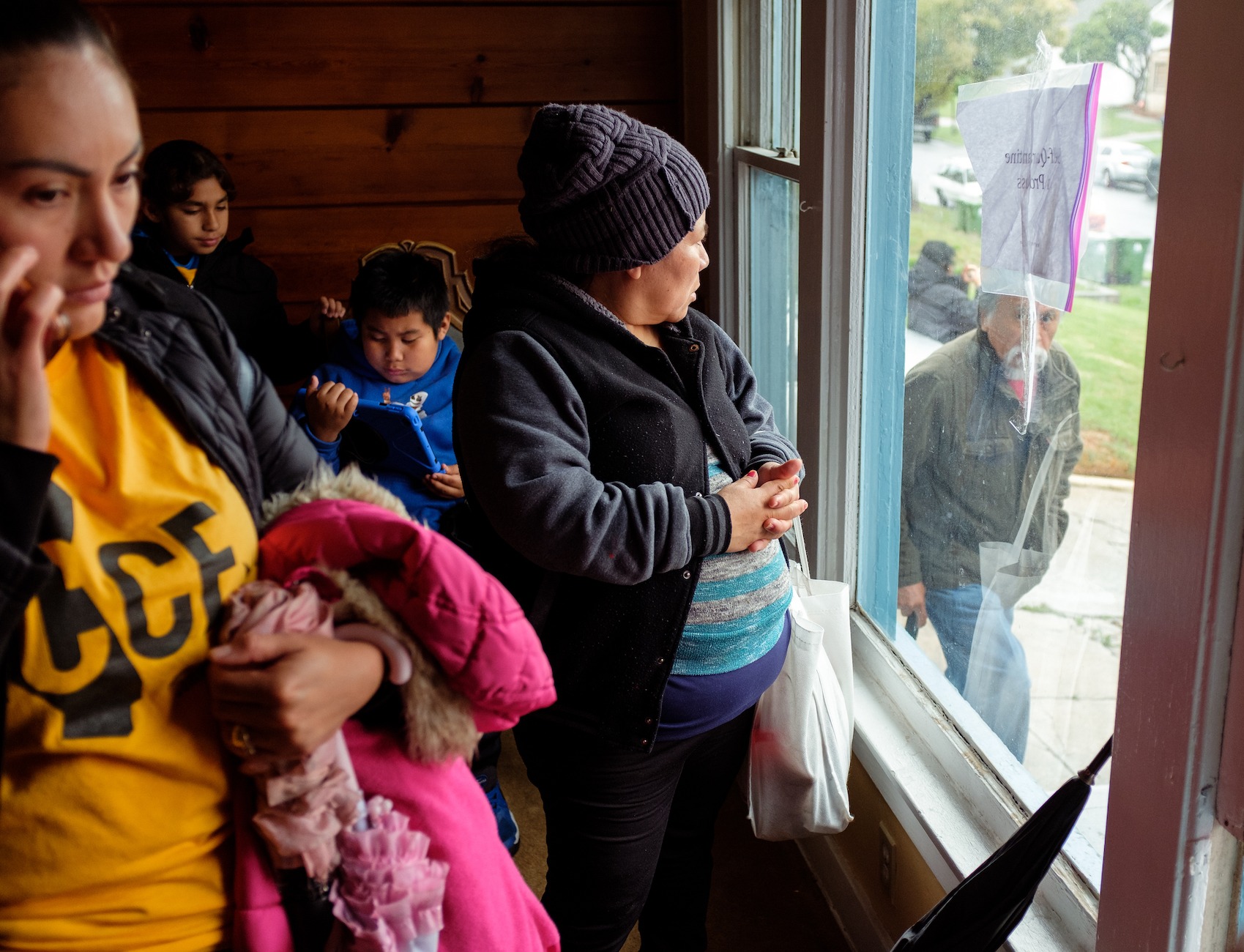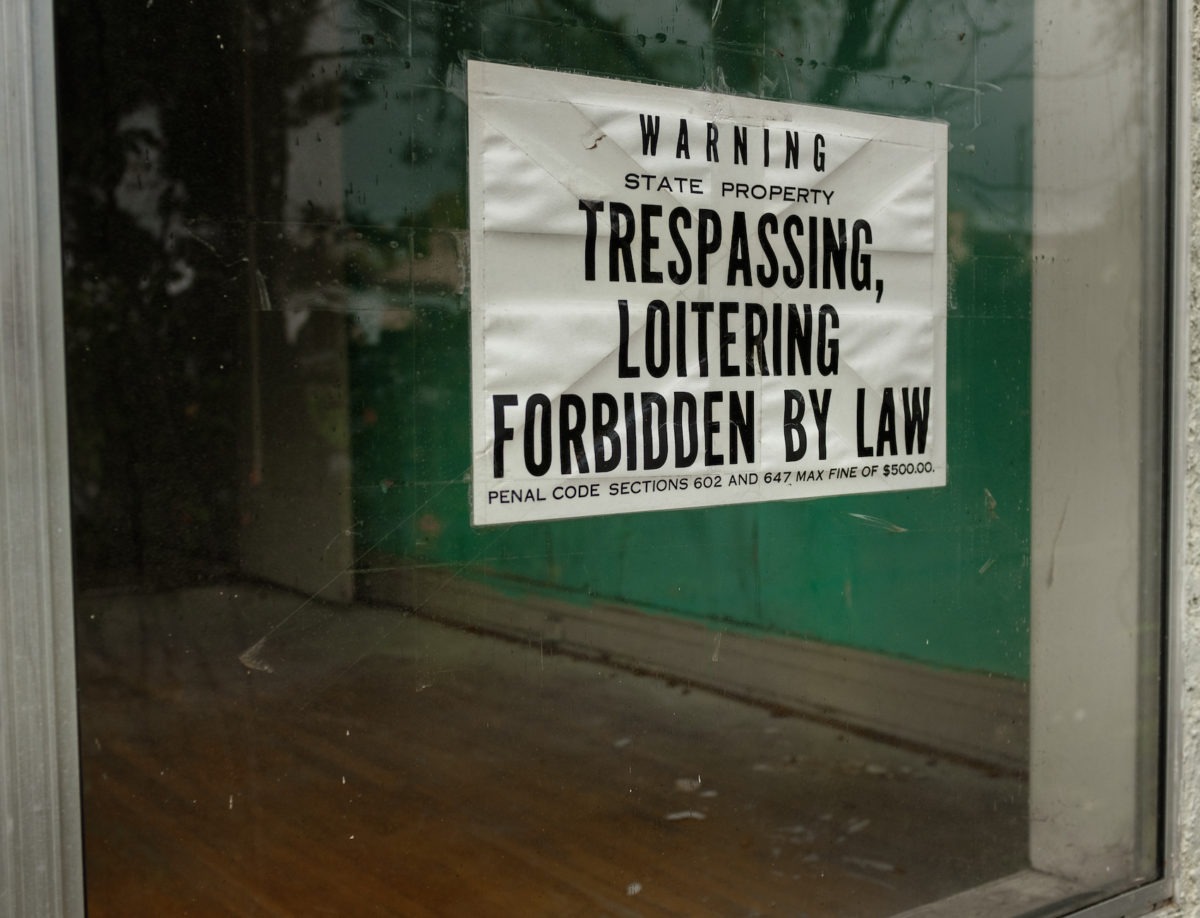Working-Class Tenants Are Seizing Vacant State-Owned Property in LA
On the intersection of two public health crises: housing and COVID-19.

This piece is a commentary, part of The Appeal’s collection of opinion and analysis.
“What do we want?” “Housing!”
“When do we want it?” “Now!”
Oftentimes this classic call and response is a metaphor, an aspirational demand for a distant future—the “now” is added for emphasis. Today, it’s quite literal. I’m standing in the driveway of a classic single-family LA home as the rain starts to come down in El Sereno, a predominantly Mexican-American neighborhood on LA’s Eastside. An unhoused family has just moved into this vacant home. Many others on this block have done the same as part of the Reclaiming Our Homes project.
The yard is dotted with signs of solidarity. The garden, unkempt for ages, is being replanted. Umbrellas tagged with “housing is a human right” and “housing is healthcare” keep people dry. Chants and speeches are intercut with mariachi performances. It’s mid-March. The city as a whole is just beginning its process of shutting down for “shelter-in-place” and for some of those who don’t have shelter, this has forced them to act boldly, as this moment serves as a ripe opportunity for tenants and organizers to prove you should never let a tragedy go to waste.
Over the past three weeks, unhoused and precariously housed Angelenos known as the Reclaimers have seized vacant state-owned homes and have decided to take housing into their own hands, now. Inspired by the Moms 4 Housing occupation in Oakland earlier this year, and spurred by the COVID-19 pandemic, tenants have organized a series of occupations that could very well be saving lives in real time, while helping push the notion of housing for everyone to the wider world.
The idea for this campaign has been percolating for months, and community members like the United Caltrans Tenants have had their eyes on these 163 vacant houses for years following a failed highway extension project that hit a dead end.
Martha Escudero, a single mother of two daughters—10-year-old Victoria and 8-year-old Meztli—works as a caregiver. In the past, she’s done social work for at-risk mothers and incarcerated youth. “Three years ago, I lived in Boyle Heights and paid $1,200 for rent. I left the country for two years. And when I returned, my rent had doubled. Then I started living with my mom, where it was four of us in a room. It was crowded. Nobody could pay rent on their own,” she told me by phone from her new home. After a falling out with one of the housemates, she knew she had to figure something else out.
She learned of Moms 4 Housing, a group of housing-insecure mothers and children who occupied a home left vacant by a bottomfeeder LLC, and quickly conjured a whirlwind of community support, media attention, and political pressure through militant grassroots direct action. “Being a mom myself, I saw how brave they were. It seemed possible,” Escudero said.
Escudero connected with Ruby Gordillo, who had been living with her three children in her brother’s home, and Benito Flores, a member of local tenants’ rights organization Los Angeles Center for Community Law and Action (LACCLA), who has been living in his van for fifteen years. With the specter of COVID-19 looming over everything, the Reclaimers, aided by tenant rights organizations like Alliance of Californians for Community Empowerment, LACCLA, and the Democratic Socialists of America Los Angeles, decided more extreme measures were clearly needed to get some movement on this graveyard of liveable spaces.

Several days into the occupation, a fleet of California Highway Patrol SUVs descended onto the scene to guard empty houses that the Reclaimers hadn’t occupied. For at least a week during this historic deadly virus outbreak, there were dozens of officers parked in driveways, running their engines, often approaching some of the occupied buildings, flashing their lights in, and otherwise harassing the Reclaimers. But no arrests have been made. Law enforcement hasn’t made a move as the militarized police did in Oakland. Last week, they boarded up the windows of the unoccupied homes and left.
Several weeks into the project, the Reclaimers’ main focus is to push California’s elected officials toward an outcome like Moms 4 Housing achieved: they are negotiating a public land trust purchase of the private home they occupied. They’re calling on Governor Gavin Newsom, State Assemblymember Wendy Carillo, and State Senator Maria Elena Durazo to help. So far, those three have disappointingly failed to comment or move on the matter, though the Reclaimers have garnered support from eight state assembly members.
While the pandemic lent urgency to this action, it would be happening regardless. Housing is already a disaster in California and intersects enormously with public health. There were roughly 60,000 unhoused people in LA pre-coronavirus, and, on average, three unhoused people die per day. Unhoused people in LA live about two decades fewer than housed people. Unhoused people often don’t have access to bathrooms or running water, let alone robust, preventative healthcare. Homelessness is a life-shortener and inextricably tied to healthcare. COVID-19 did not create these deep inequities. It amplified them.
While it’s commonly referred to as a “housing crisis,” that’s not really accurate. After all, plenty of housing exists. LA and Oakland aren’t the only places with a deep well of empty housing stock, both publicly and privately owned. These exist everywhere. Empty, livable space in major cities uninhabitable for all but the wealthy is one of the defining symbols of the last decade.
It’s not an issue of scarcity. It’s a crisis of who gets housing under capitalism. While vacancy is a thorny subject, it’s undeniable we have way more empty homes, hotel rooms, and now AirBNBs to help. LA is one of the wealthiest cities in human history. There are at least 58 billionaires living in the county (many of whose fortunes are built on tax avoidance and exploitation of the poor), one for every thousand people who are houseless. It’s not a question of having the resources; it’s about shining a light on who’s hoarding them.
These housing occupations, which may have appeared radical not too long ago, suddenly resonate with a broad swath of people not already directly swept up in the tenant struggle. If the 2010s were defined by a widespread loss of housing, as rents and speculation exploded, violent evictions roiled cities around the world fueled by AirBNB, hyper investment in hotel and luxury development, profound wage inequality, and neoliberalism at large, may the next decade be known for a dramatic rehousing of people and a massive decommodification of what is recognized by so many as a human right.
The Reclaimers are part of a broader renaissance and reimagining of civil disobedience, from the Oakland Moms to the El Sereno Reclaimers, rent strikes, car protests targeting governors and mayors, to projects currently being cooked up by tenants and organizers scrambling in the heart of cascading crises. As AirBNBs and hotels have now emptied out, generating new frontiers of habitable space and direct action, the potential for this movement to proliferate feels endless.
Last week, the Department of Water and power cut utilities off at one of the Reclaimers’ homes. But that hasn’t dampened their resolve.
“My dad is an immigrant from Mexico,” Escudero tells me. “He has an elementary school education, worked as a janitor, and he worked to be a homeowner. I’ve done everything right in society, born and raised in the U.S., have a college degree, speak English, and I can’t even rent a home in LA. Things have really changed. This is not an accident. This housing crisis has been created by people on Wall Street and at city hall. We need to take it back.”
The time for dramatic action isn’t once the epidemic is over and the cruel “normalcy” of a deeply unjust system is reestablished. It’s now.
Jonny Coleman is an organizer with NOlympics LA and DSA-LA, one of the supporters of Reclaiming Our Homes.
